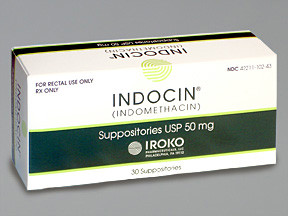INDOMETHACIN - RECTAL
PHONETIC PRONUNCIATION: (IN-doe-METH-a-sin)
COMMON BRAND NAME(S): Indocin
GENERIC NAME(S): indomethacin
Uses
USES: Indomethacin is used to relieve pain, swelling, and joint stiffness caused by arthritis, gout, bursitis, and tendonitis. Reducing these symptoms helps you do more of your normal daily activities. This medication is known as a nonsteroidal anti-inflammatory drug (NSAID). If you are treating a chronic condition such as arthritis, ask your doctor about non-drug treatments and/or using other medications to treat your pain. See also Warning section.
How to use INDOMETHACIN - RECTAL
HOW TO USE: Read the Medication Guide provided by your pharmacist before you start using indomethacin and each time you get a refill. If you have any questions, ask your doctor or pharmacist. If the suppository is too soft to insert, put it in cold water or refrigerate it for 30 minutes before removing the foil wrapper. Unwrap the foil and moisten the suppository with a little water. Lie down on your left side with right knee bent. Push the suppository into the rectum with your finger. Remain lying down for a few minutes, and avoid having a bowel movement for at least an hour to allow the drug to be completely absorbed. The dosage is based on your medical condition and response to treatment. Adults should not use more than 200 milligrams per day. For children, dosage is also based on weight. The maximum dose for children is 4 milligrams per kilogram a day or 150 to 200 milligrams a day, whichever is less. To reduce your risk of side effects (such as stomach bleeding), use this medication at the lowest effective dose for the shortest possible time. Do not increase your dose or use it more often than prescribed. For ongoing conditions such as arthritis, continue using it as directed. Discuss the risks and benefits with your doctor or pharmacist. For certain conditions (such as arthritis), it may take up to 4 weeks of using this drug regularly before you get the full benefit. If you are using this drug "as needed" (not on a regular schedule), remember that pain medications work best if they are used as the first signs of pain occur. If you wait until the pain has worsened, the medication may not work as well. Tell your doctor if your condition worsens.
Side Effects
Precautions
Interactions
Overdose
Images
Reviews
Warning
WARNING: This drug may rarely cause serious (rarely fatal) bleeding from the stomach or intestines. This side effect can occur without warning at any time during treatment with indomethacin. The elderly are at increased risk for serious stomach/intestinal bleeding. Nonsteroidal anti-inflammatory drugs (including indomethacin) may rarely increase the risk for a heart attack or stroke. This effect can happen at any time while using this drug but is more likely if you use it for a long time. The risk may be greater if you have heart disease or increased risk for heart disease (for example, due to smoking, family history of heart disease, or conditions such as high blood pressure or diabetes). Do not use this drug right before or after heart bypass surgery (CABG). Talk to your doctor or pharmacist about the benefits and risks of treatment, as well as other possible medication choices. Stop using indomethacin and get medical help right away if you notice any of the following rare but very serious side effects: black stools, persistent stomach/abdominal pain, vomit that looks like coffee grounds, chest pain, shortness of breath, weakness on one side of the body, sudden vision changes, slurred speech.
Disclaimer
IMPORTANT: HOW TO USE THIS INFORMATION: This is a summary and does NOT have all possible information about this product. This information does not assure that this product is safe, effective, or appropriate for you. This information is not individual medical advice and does not substitute for the advice of your health care professional. Always ask your health care professional for complete information about this product and your specific health needs.

No Reviews Yet